News
Welcome!

I am an ecologist interested in biodiversity both within and between species and how they drive community stability and functioning. As an experimentalist, I have conducted experiments in the field, in the glasshouse, or in the lab with a number of different organisms, both aquatic and terrestrial. Currently, I research the intraspecific variation of European beech and how this majestic tree species responds to novel stressful environments. I am a Group Leader at the Department of Geography at the University of Zurich in Switzerland.
For MSc students
Are you interested in doing a Master thesis project with me? Check out the available topics here and then contact me! Start time of the projects is flexible. I'm open to students from different MSc programs based in and around Zurich.
I am also always happy to supervise shorter research internships that count towards a B.Sc. degree (e.g., BIO 357).
E-mail: sofia.vanmoorsel[at]geo.uzh.ch

News
December 17, '25. Blog post about the two new beech experiments. Beech trees in a changing climate: A new genetic diversity experiment takes root at Irchel Campus. GIUZ Blog
December 5, '25. New story in Horizonte. This time I had the pleasure to talk with Julia Glaus about her research on modelling how far avalanches spread. in German
November 26, '25. A new small beech biodiversity experiment is starting today! 190 4-year old beech saplings growing in two contrasting genetic diversity levels. Although it was very muddy and snowy at times, we are happy to finally have the little trees in the ground.

Photo: Oliver Selmoni, 2025
November 13, '25. Master thesis submitted! Vanessa Schnellmann has successfully completed her MSc thesis entitled Response variation to glyphosate in Lemna minor ecotypes from across Switzerland. She conducted a greenhouse common garden experiment with seven ecotypes of Lemna minor collected from across Switzerland grown in different concentrations of glyphosate, one of the most sold herbicide worldwide. Congratulation so this massive mile stone and accomplishment, Vanessa!
November 12, '25. New beech common garden experiment established We are happy to have established a new forest site in Effretikon, where we will now grow and track 450 young European beech with origins from all across Europe for the coming years.
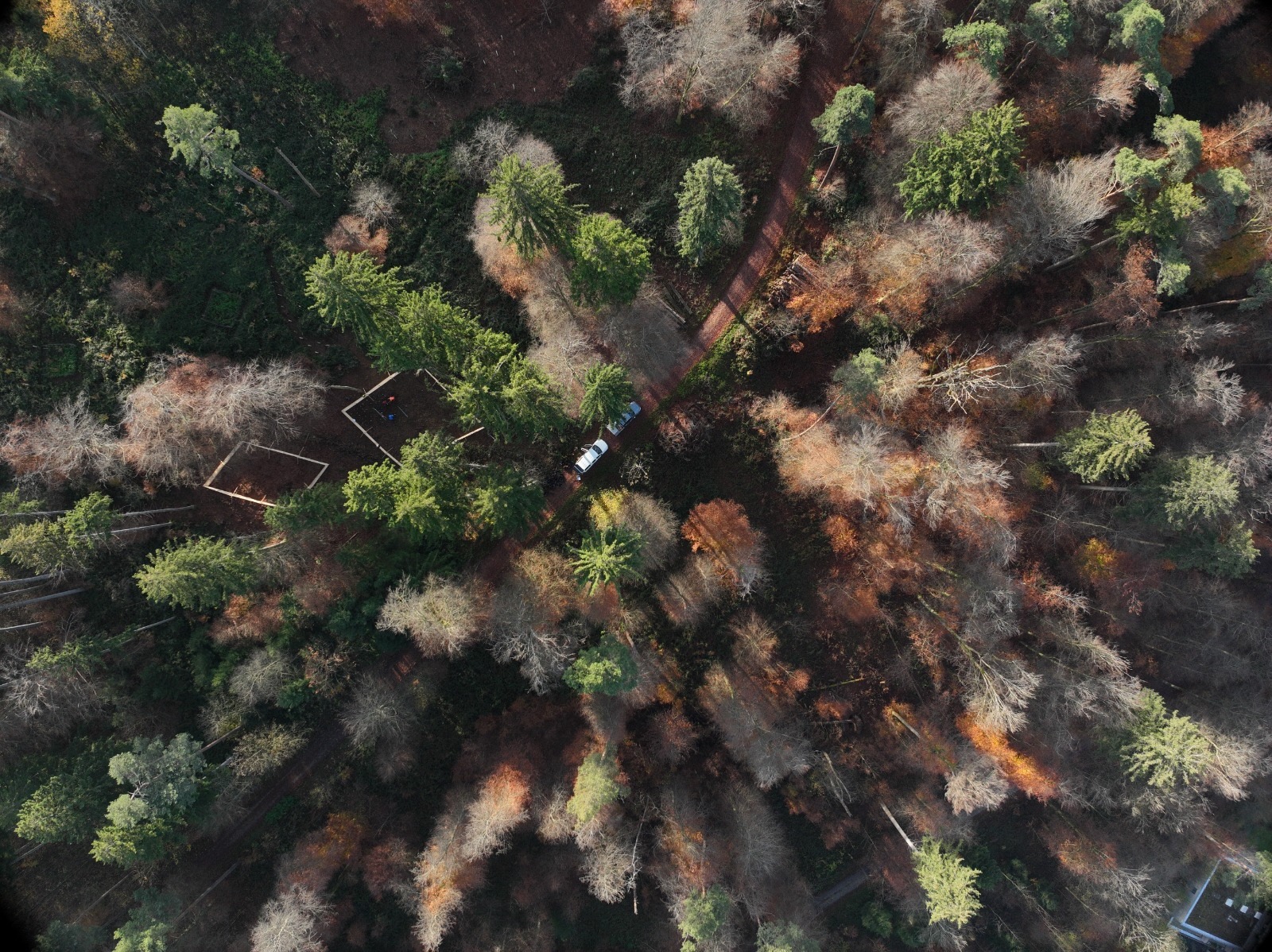
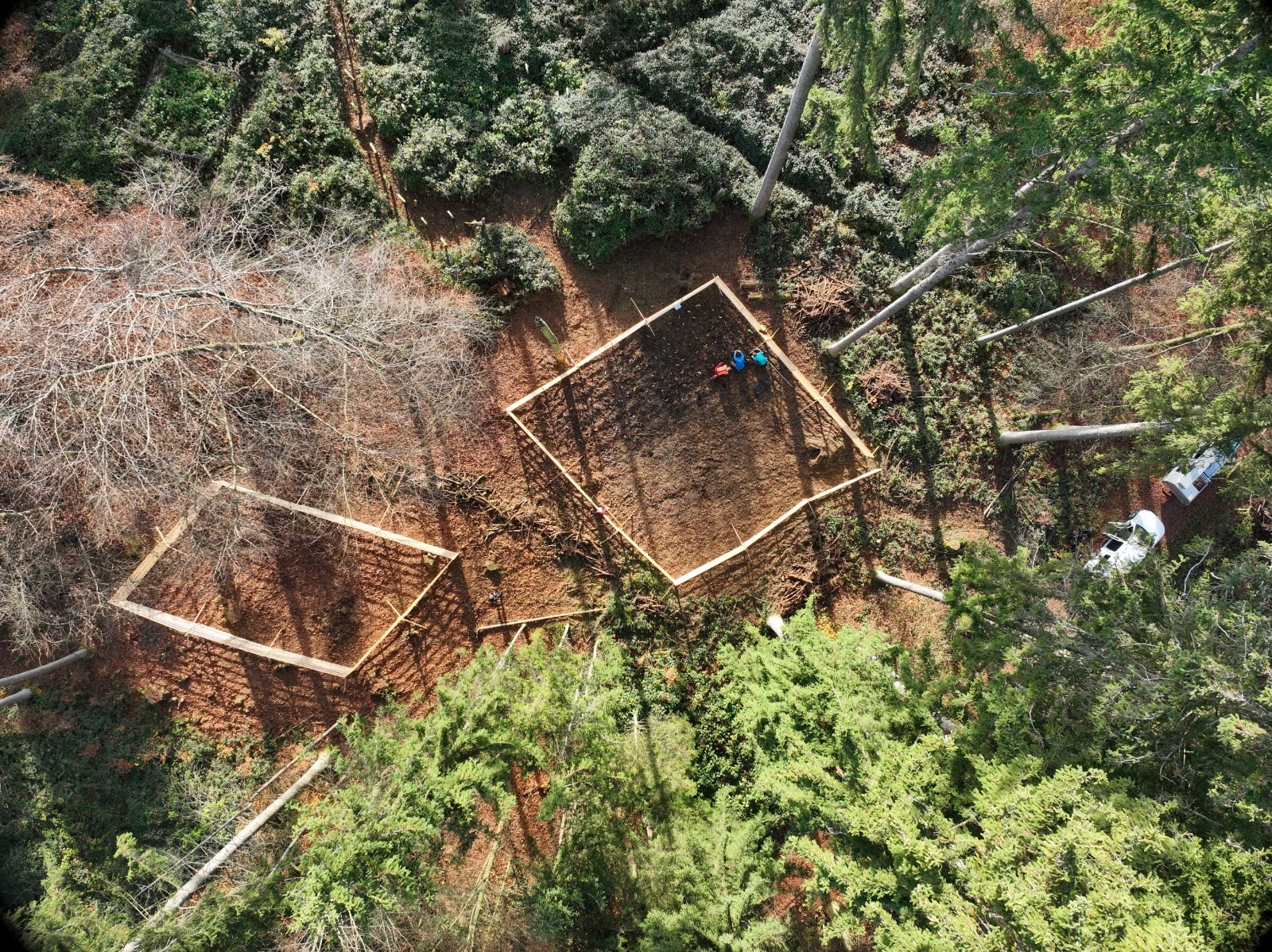
Photos: Meredith Schuman, 2025
November 2, '25. Open PhD position available in my group. I am looking for a PhD student to work on drought tolerance of European beech using a variety of methodological approaches from remote sensing to genomics and metabolomics. Application deadline: 8 December 2025. Apply here!
October 9, '25. Article on our beech common garden experiment in "dergartenbau" Auf den Spuren der Buche von Morgen? Die Schweizer Buchen leiden unter den Folgen des Klimawandels. Ein Forschungsprojekt der Universität Zürich geht diesem Phänomen auf die Spur. Gleichzeitig wollen die Wissenschaftlerinnen und Wissenschaftler herausfinden, wie die Buchenpopulationen von morgen aussehen könnten. dergartenbau Ausgabe 18/2025
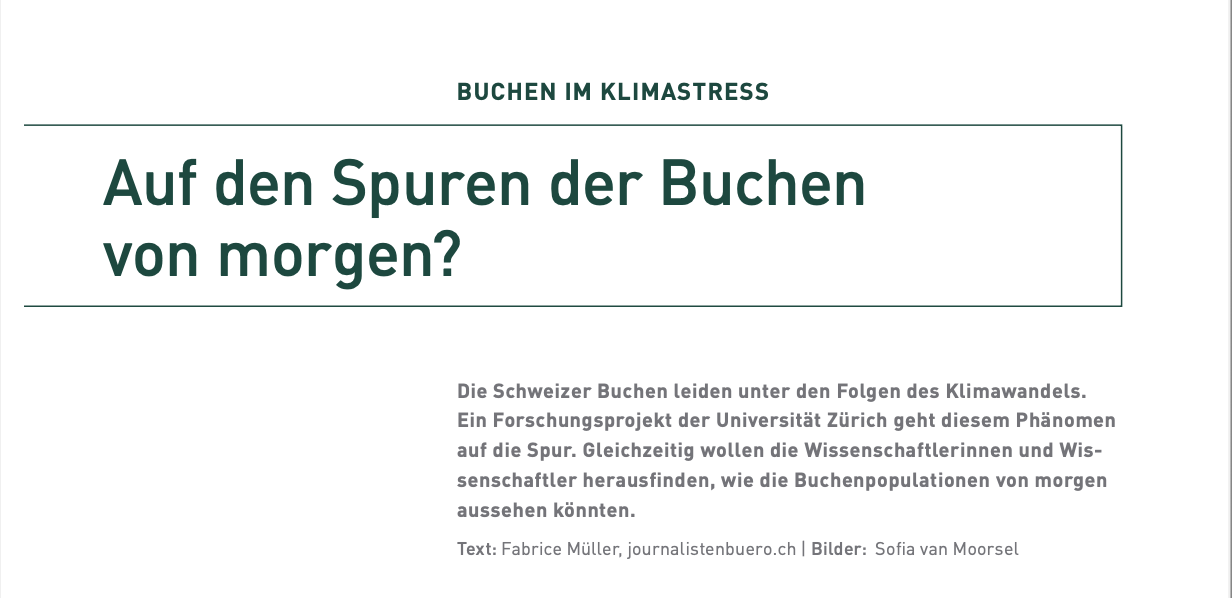
October 7, '25. Seminar at the BC3 in Bilbao. It was a great pleasure to speak to a highly engaged audience and to get so many insightful questions. A very nice visit to Bilbao, many thanks for the invitation.
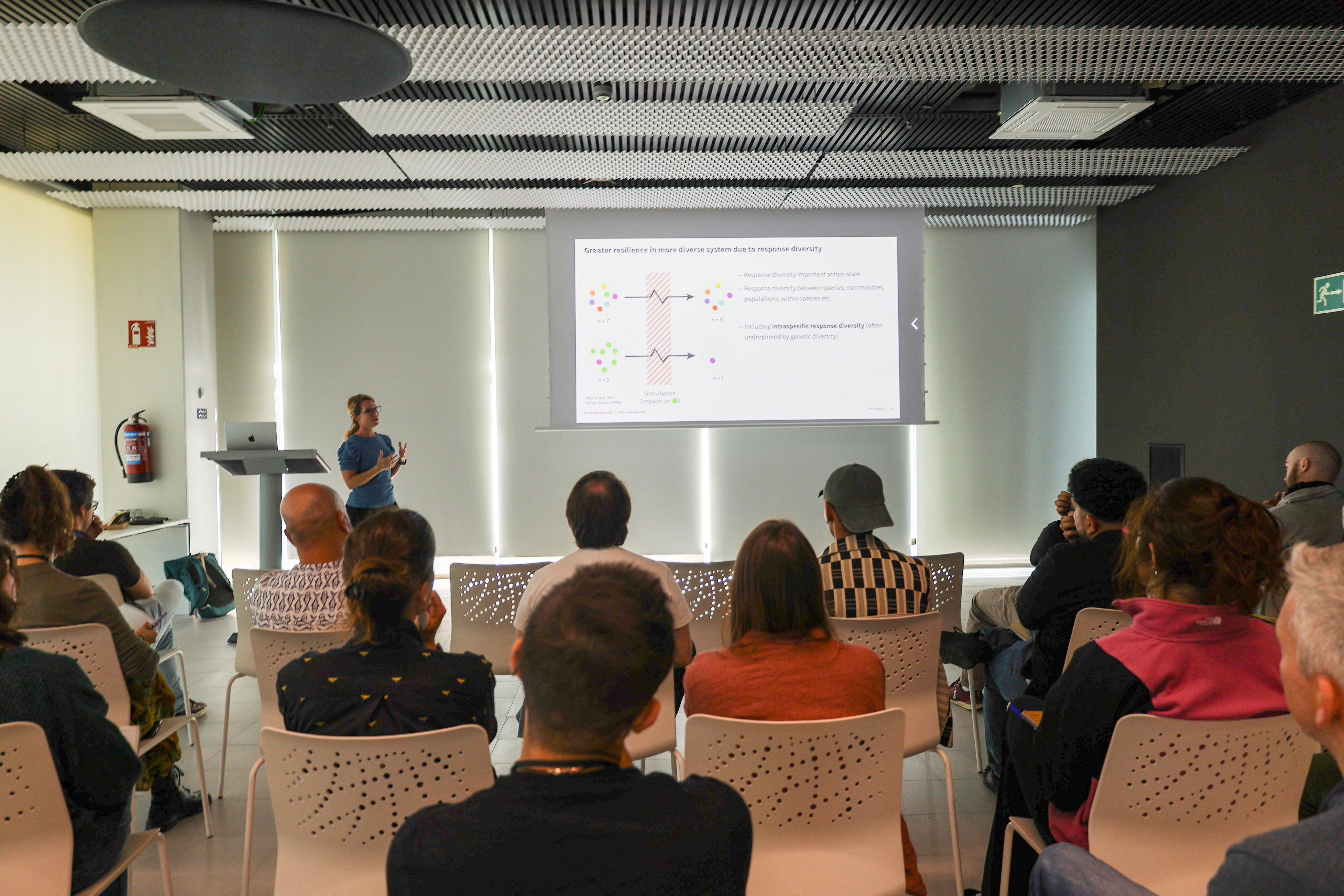
September 26, '25. SNSF project grant application approved. My project "Beech under global change: Untangling the genetic, physiological, and ecological foundations of drought tolerance" will now actually happen over the next 4 years!
August 18, '25. Symposium at ESEB in August Our symposium Adaptation to
environmental changes in trees through the lens of common gardens and genomics was a success with a great line up of speakers and associated posters. Thank you all for participating and making new connections!
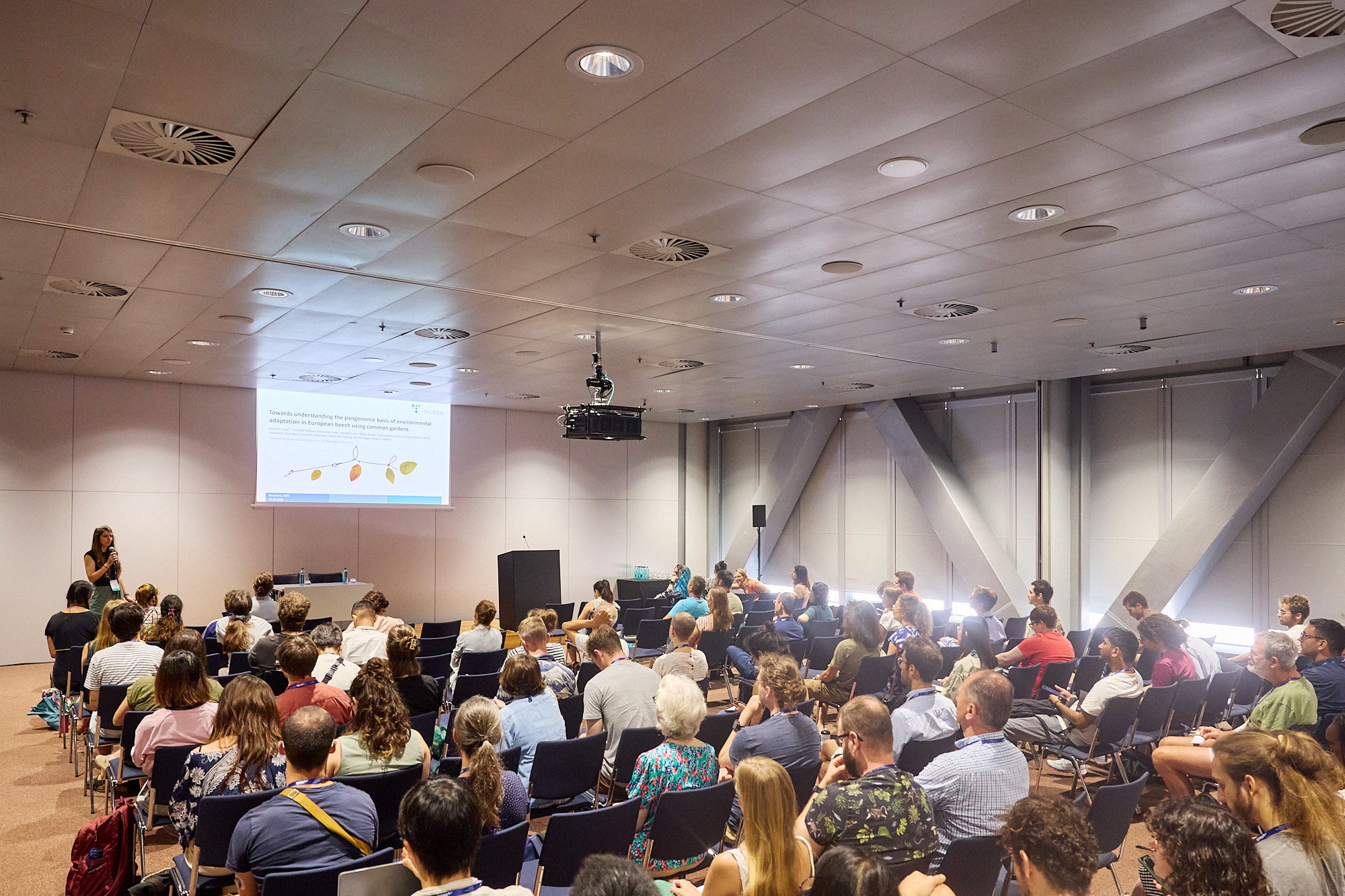
June 01, '25. Welcome, Bryan! We're happy that Bryan Mäder will conduct his B.Sc. thesis project with us in the framework of the drought experiment in the beech sapling common garden experiment!
May 22, '25. New GIUZ blogpost. Check out the blogpost about our recent workshop on beech genomes for the future!
May 19, '25. Pint of Science. I really enjoyed having been part of the Pint of Science Switzerland/Zurich Festival at the Alehouse. In front of a packed room, I talked about biodiversity and its importance for humanity and also touched upon the importance of genetic diversity, i.e. diversity within single species. Thanks to the organizers for inviting me and to everyone who should up for a pint of excellent beer and a pint of science.

Photo: Cheng Li
April 04, '25. New publication Ting's paper Identifying seed families with high mixture performance in a subtropical forest biodiversity experiment has been published in New Phytologist! Her finding that different seed families respond differently to diversity treatments sheds new light on the importance of genetic diversity in forest restoration experiments for more resilient forests.
April 04, '25. Workshop on "Beech Genomes for the Future" Together with the SwissForestLab, we organized a thematic workshop on the topic Beech Genomes for the Future. For this workshop, we invited researchers who work on beech genomics, including GWAS with natural and experimental populations, experimental approaches involving drought and climate, studies investigating assisted gene flow, and researchers developing strategies to monitor beech genetic diversity. In the drought stress context, we are particularly interested in approaches to find the genetic basis of complex traits such as drought response that are not governed by individual genes and likely to be context-dependent.

February 28, '25. Master thesis submitted Natalie has submitted her MSc thesis entitled Assessment of the response to herbicide pollution in an aquatic plant. She studied how increasing concentrations of metazachlor, a highly prevalent and ecotoxic chloroacetamide herbicide, affect growth rates and morphological traits in five Lemna minor populations from different Zurich water bodies. Congratulations, Natalie!

(Figure from Master thesis Natalie Bilen)
February 14, '25. SwissForestLab ScienceDay2025 We had a really great day at this one-day conference that brought together forest/tree scientists from across Switzerland. I gave a talk and Toja, Dom and Haruka presented posters about their research!


January, 17 '25. Paper accepted I am super happy that our paper Leaf spectroscopy reveals drought response variation in Fagus sylvatica saplings from across the species' range has been accepted for publication at the AGU journal Journal of Biophysical Research: Biogeosciences. Thanks so much to my former two MSc students Dave and Jolanda for their work and dedication to the project. It is great and impressive that the findings of their MSc theses are now being published in a peer-reviewed journal. Link to the paper
January, 10 '25. Symposium at ESEB in August We are organizing a symposium at the Congress of the European Society for Evolutionary Biology on adaptation of trees to global change. We would like to connect evolutionary biology with applied efforts to sustain biodiverse forests in a rapidly changing world. If you're interested in contributing with an abstract, you can do so from 25 January 2025. The symposium description you can find here.
October, 23 '24. Days in the life of a Postdoc My friend Elisa Granato has written a really nice blogpost on the daily lives of three different Postdocs, including myself. We all tracked in detail the tasks we were working on every day for several weeks and made some comparisons between the three of us and between different stages of being a Postdoc.
July 25, '24. New preprint Dave Kurath and I have recently submitted our paper Leaf spectroscopy reveals drought response variation in Fagus sylvatica saplings from across the species' range. We demonstrate that high-resolution, broad-range leaf spectroscopy is an effective and non-destructive tool to assess individual drought responses that can characterize functional intraspecific variation among young beech trees. We are a total of 12 co-authors, so it was a big collaborative effort, with Dave doing an excellent job leading the paper. Curious to find out whether people like the paper and our approach. Check out the preprint here.
June 3, '24. Paper accepted I am so happy that our paper Covering the bases: population genomic structure of Lemna minor and the cryptic species L. japonica in Switzerland has now been accepted to be published at Ecology and Evolution. It's a paper that I'm proud of with a fantastic set of co-authors in a journal that I really like. So, it checks all the boxes! Link to the paper
May 22, '24. Our work on beech in the UZH news
Deutsch Der Klimawandel setzt den hiesigen Buchen zu. Forschende der UZH wollen nun lernen, wie die Buchenwälder von morgen aussehen könnten. Dazu gehen sie experimentell vor und nutzen Spektraldaten, um die Biodiversität der Buchenwälder zu erforschen. UZH News
English Climate change is afflicting indigenous beech trees in Switzerland. Researchers at UZH now want to find out what Swiss beech forests might look like in the future. To do that, they are taking an experimental approach, using spectral data to investigate the biodiversity of the beech forests. UZH News
May 6, '24. New preprint My colleagues in the Predictive Ecology lab conducted a long-term microcosm experiment with aquatic protists in which they manipulated two potential drivers of forecastability: biodiversity and environmental change. The output of this really long and complex experiment is now available to anyone interested. Have a look! Biodiversity increases the forecastability of species abundances in changing environments.
February 16, '24. New preprint We just posted a new preprint on bioRxiv! Covering the bases: population genomic structure of Lemna minor and the cryptic species L. japonica in Switzerland. Read it here!
We looked at the genetic differences and how populations are structured for 23 different groups of Lemna plants found naturally in Switzerland, using whole-genome sequencing. We used two different ways to analyze the data. One method did not rely on any previous genetic information (called reference-free kmer approach), and the other method did (using two different reference genomes). From these analyses, we found two main groups, which matched up with different species. The first group had the L. minor plants we were studying, and the second group had plants from a hidden species called Lemna japonica. We thus revealed that Lemna japonica is much more widespread than previously thought!
January 30, '24. MSc thesis submitted Dave has submitted his MSc thesis entitled Hyperspectral leaf spectroscopy reveals the drought response of Fagus sylvatica seedlings from across the species' range to obtain his Master in Geography with a specialization in remote sensing. Congrats, Dave!
January '24. MSc thesis submitted and defended We are proud of Jolanda who submitted her MSc thesis entitled Effects of simulated drought on phenotypic traits of European beech saplings from different provenances to the Master program in Quantitative Environmental Sciences. Congratulations! And thank you Jolanda for your dedication and for being such a great group member. You will be missed and we wish you all the best for your future endeavours.
December 7, '24. Horizonte story In my capacity as freelance science journalist, I wrote a short piece on the paper Joint optimization of land carbon uptake and albedo can help achieve moderate instantaneous and long-term cooling effects by Alexander Graf et al. You can read the story here (in German).
August 8, '23. Paper accepted Our paper entitled High tolerance to zinc but no evidence for local adaptation in the aquatic plant Lemna minor led by Sofia Vámos has been accepted at Nordic Journal of Botany. I am very proud of Sofia (pictured below) who put her heart and soul into her Master thesis project, which was the basis of this paper. Very happy about this final outcome!
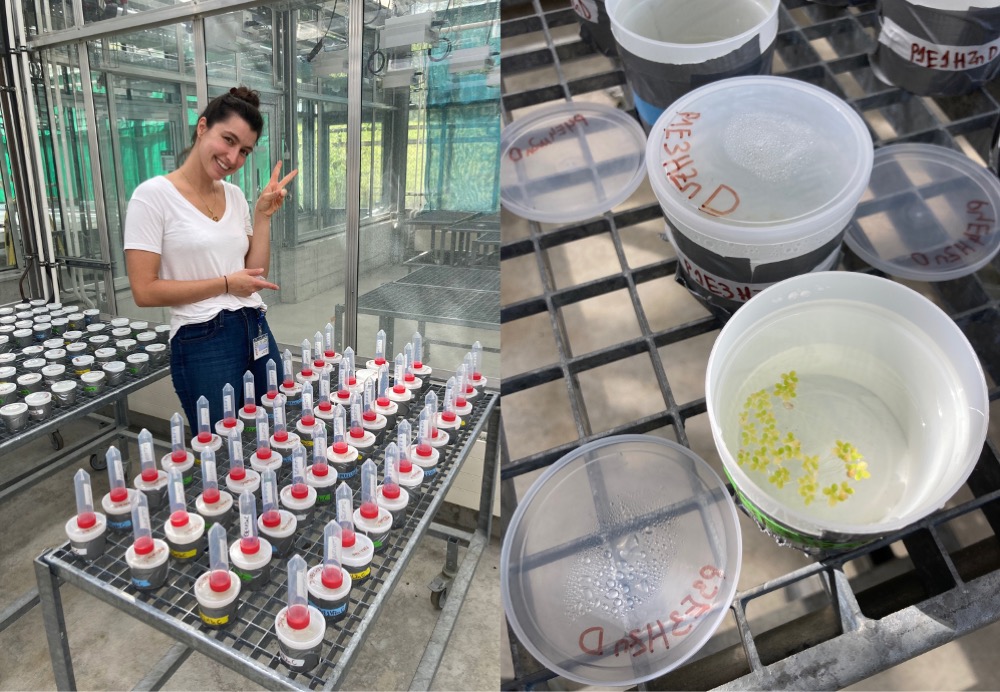
June 8, '23. Horizonte story on wetland loss I wrote a short piece on a paper that for the first time was able to estimate global wetland losses over the past three centuries. Have a look here (in German).
May 4, '23. Paper accepted I am excited that our paper led by Mark Jewell Presence of microbiome decreases fitness and modifies phenotype in the aquatic plant Lemna minor has been accepted for publication at AoB PLANTS! It is known that the plant microbiome influences its hosts, but that, depending on the context and the plant, the effect is increasing or decreasing host performance. We found that in the small and free-floating aquatic plant Lemna minor, its microbiome reduced growth rate and changed the phenotype of the plant. These effects were consistent for eight different plant genotypes and only moderately depended on the context, specifically light and nutrient availability. Removing the microbiome homogenized the phenotype and influenced how the L. minor populations responded to the abiotic environment. This suggests that the microbiome at least in part mediates the plant’s response to the environment. You can read the whole paper here and it's fully open access!
Below some impressions from behind the scenes of my contribution to this paper!
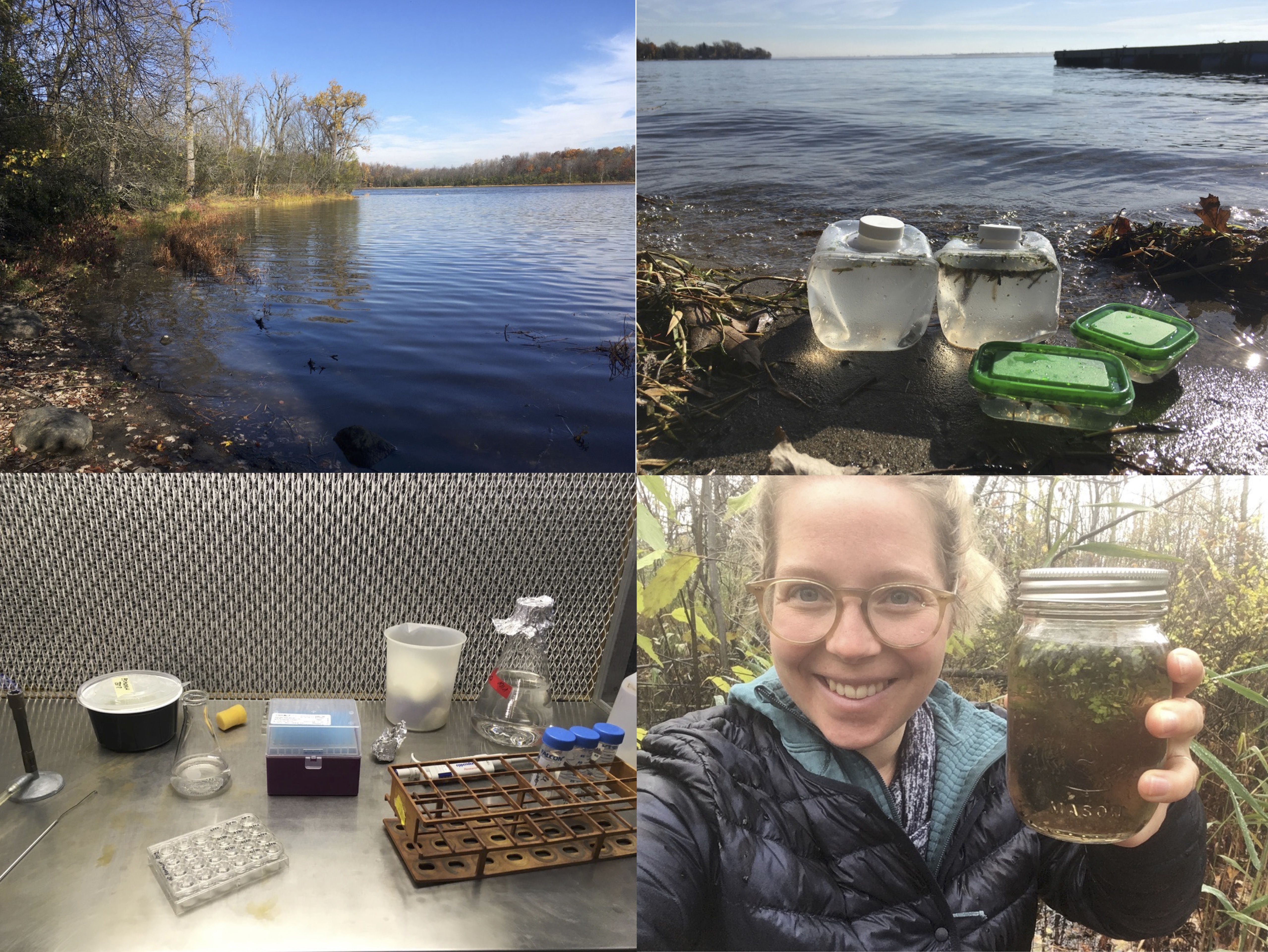
April 24, '23. Preprint updated We uploaded a new version of our preprint High tolerance to zinc but no evidence for local adaptation in the aquatic plant Lemna minor to EcoEvoRxiv. Have a look! It now includes a kinship matrix based on whole-genome sequencing of the four studied ecotypes.
April 14, '23. New publication The paper entitled Functional diversity can facilitate the collapse of an undesirable ecosystem state led by Romana Limberger and Owen Petchey has been published at Ecology Letters. Using a mathematical model of anoxic–oxic regime shifts, we explored how trait diversity in three groups of bacteria influences resilience. We found that greater diversity can increase resilience, but can also promote collapse when functional diversity occurs in a functional group that negatively influences the state it occurs in.
April 12, '23. Geographical distribution of floating aquatic plants I contributed to a PhD chapter of my good colleague Mark Jewell Davidson at McGill on the geographical distribution of floating aquatic plants in relation to environmental conditions in Southern Quebec, Canada. The paper has now been accepted at Aquatic Botany . The paper shows that species distributions of floating aquatic plants are driven by specialization to water phosphorus, and that the plant species richness showed a latitudinal gradient with fewer species further north.
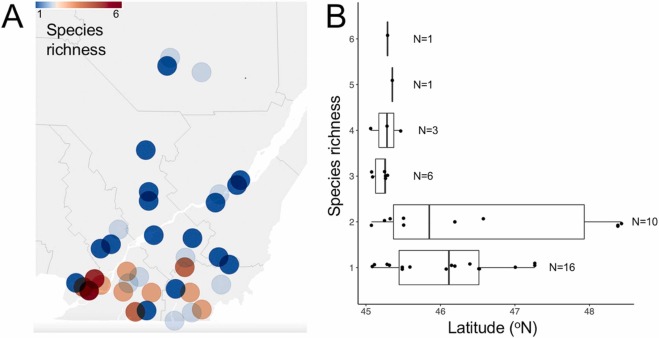
January 26, '23. Welcome, Dave! From February, David Kurath joins the beech common garden project to study drought stress responses in beech tree seedlings in the framework of his MSc thesis in Geography/Remote Sensing at the University of Zurich. I am very excited to have him on board, and I am looking forward to working with him.
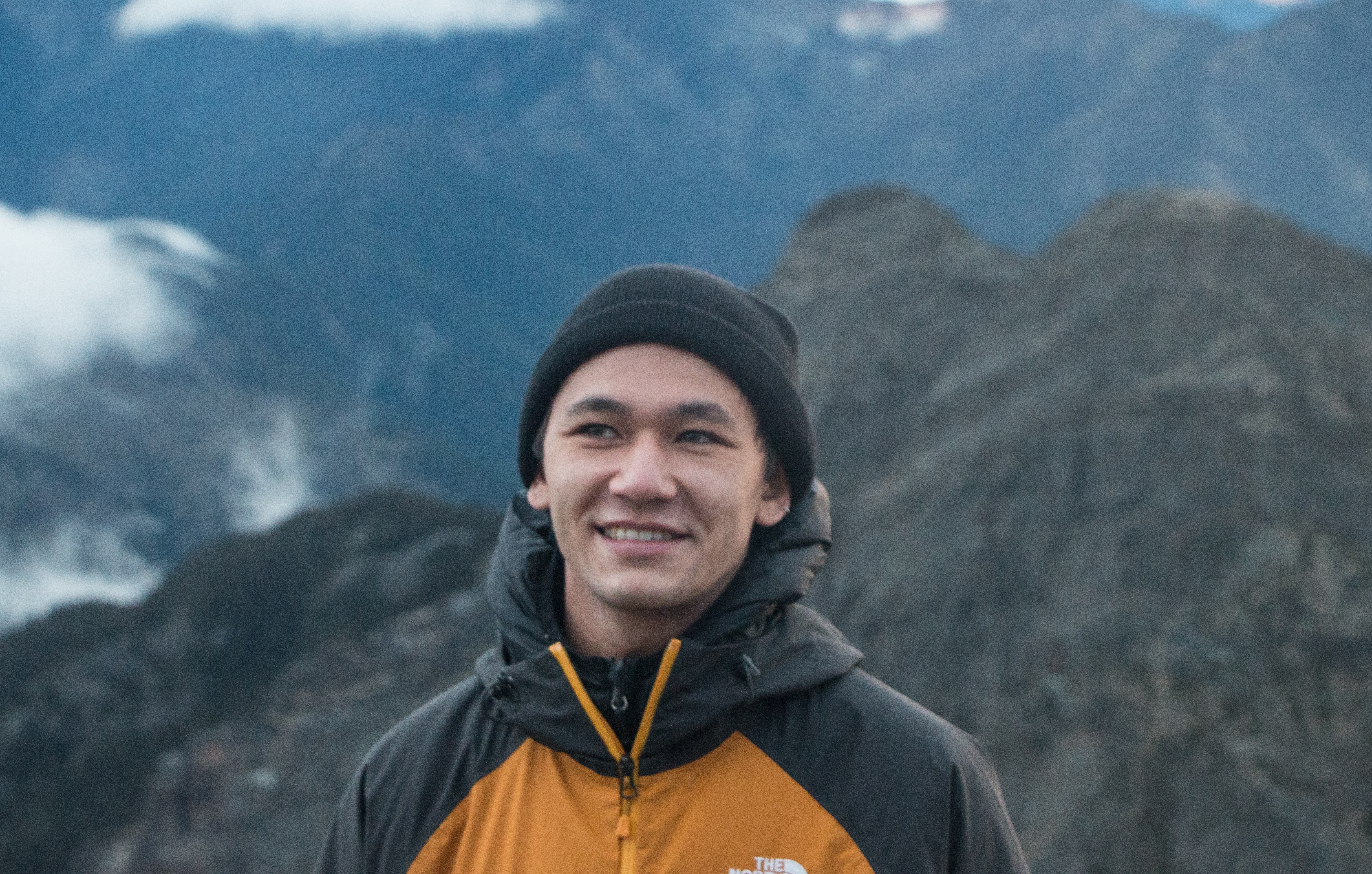
January 1, '23. Welcome, Jolanda! This month, Jolanda Klaver joined the beech common garden project to study drought stress responses in beech tree seedlings in the framework of her MSc thesis in Quantitative Environmental Sciences at the University of Zurich. I am very excited to have her on board, and I am looking forward to working with her.
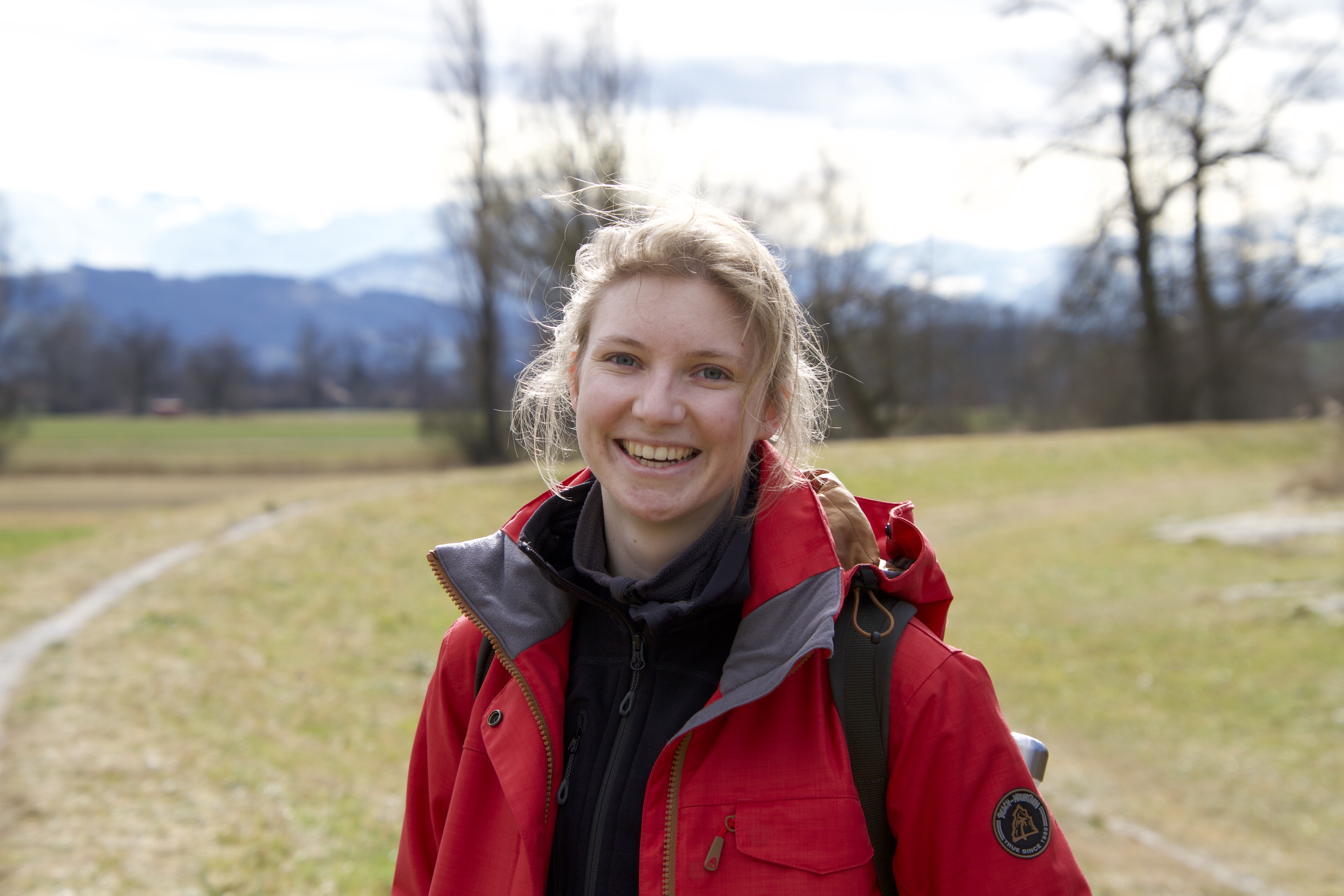
November 23, '22. Paper accepted! Our collaborative opinion paper Predicting effects of multiple interacting global change drivers across trophic levels has been accepted for publication at Global Change Biology. We propose that reaction norms, the relationships between a driver and vital rates like growth, mortality, and consumption, provide insights to the underlying mechanisms of community responses to multiple drivers. The article is available online. And it's open access!
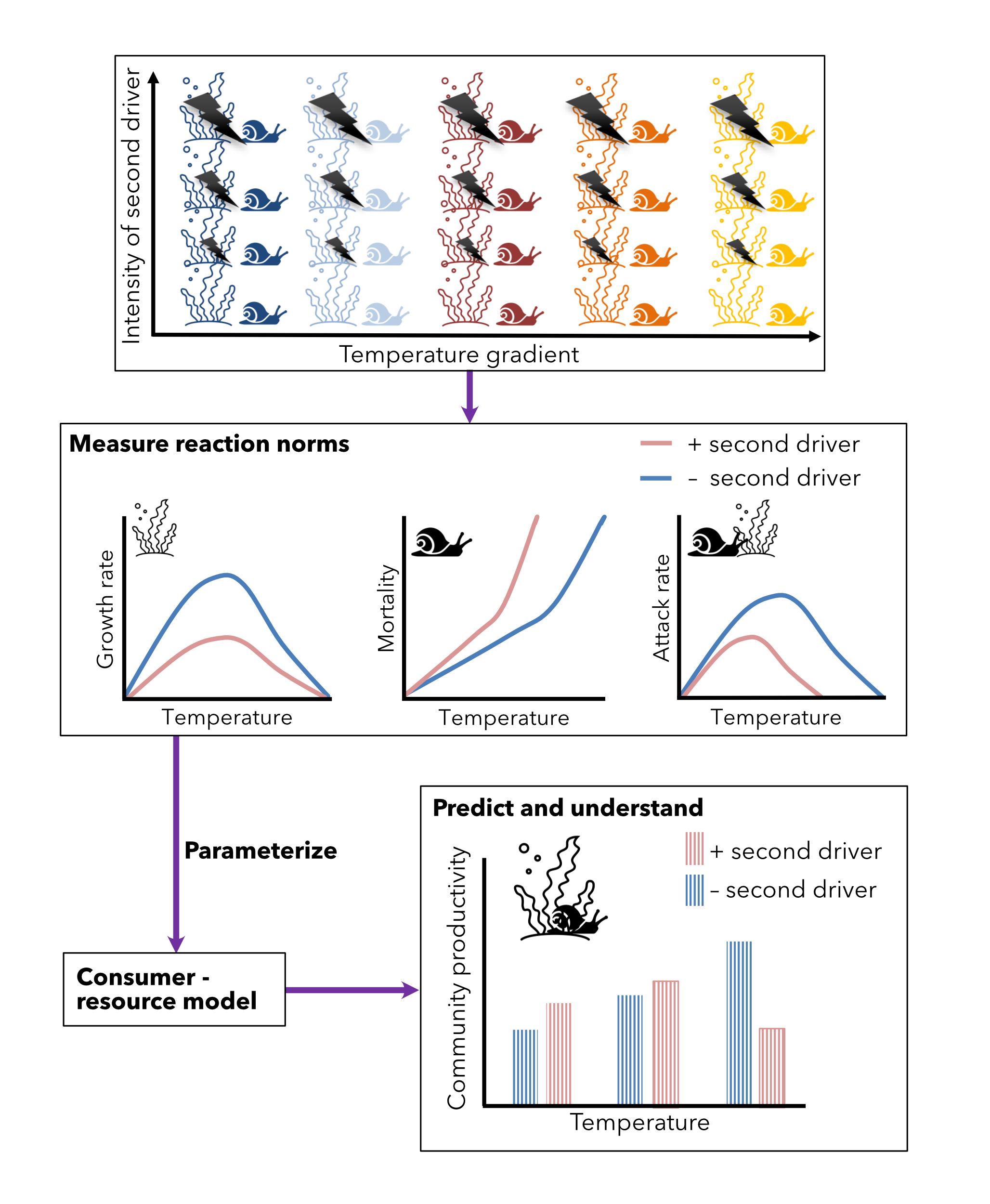
November 17, '22 New Departmental webpage online. My brand-new research group Plant Ecology and Global Change has now its own webpage. In the Plant Ecology and Global Change group, we are interested in how ecological communities respond to global change drivers. We seek to understand how intra- and interspecific diversity and rapid evolution separately or interactively shape plant community stability and functioning in changing and deteriorating environments.
October 10, '22. Group leader status. This month, the Department of Geography of the University of Zurich has awarded me the status of group leader. I am excited to build up my own group over the next years. More updates on my emergent group coming soon!
July 13, '22. New preprint posted on Authorea. A manuscript led by Mark Jewell Davidson is now available to the world as a preprint! It's such a pleasure to collaborate with Mark on this paper, especially as my countless hours of duckweed sterilization have been put to good use: We show that the aquatic plant Lemna minor has higher fitness when we removed their microbiome. This was the case for eight different genotypes and across several environmental conditions. We also found that the presence vs absence of the microbiome modified the plant phenotype. Happy reading!
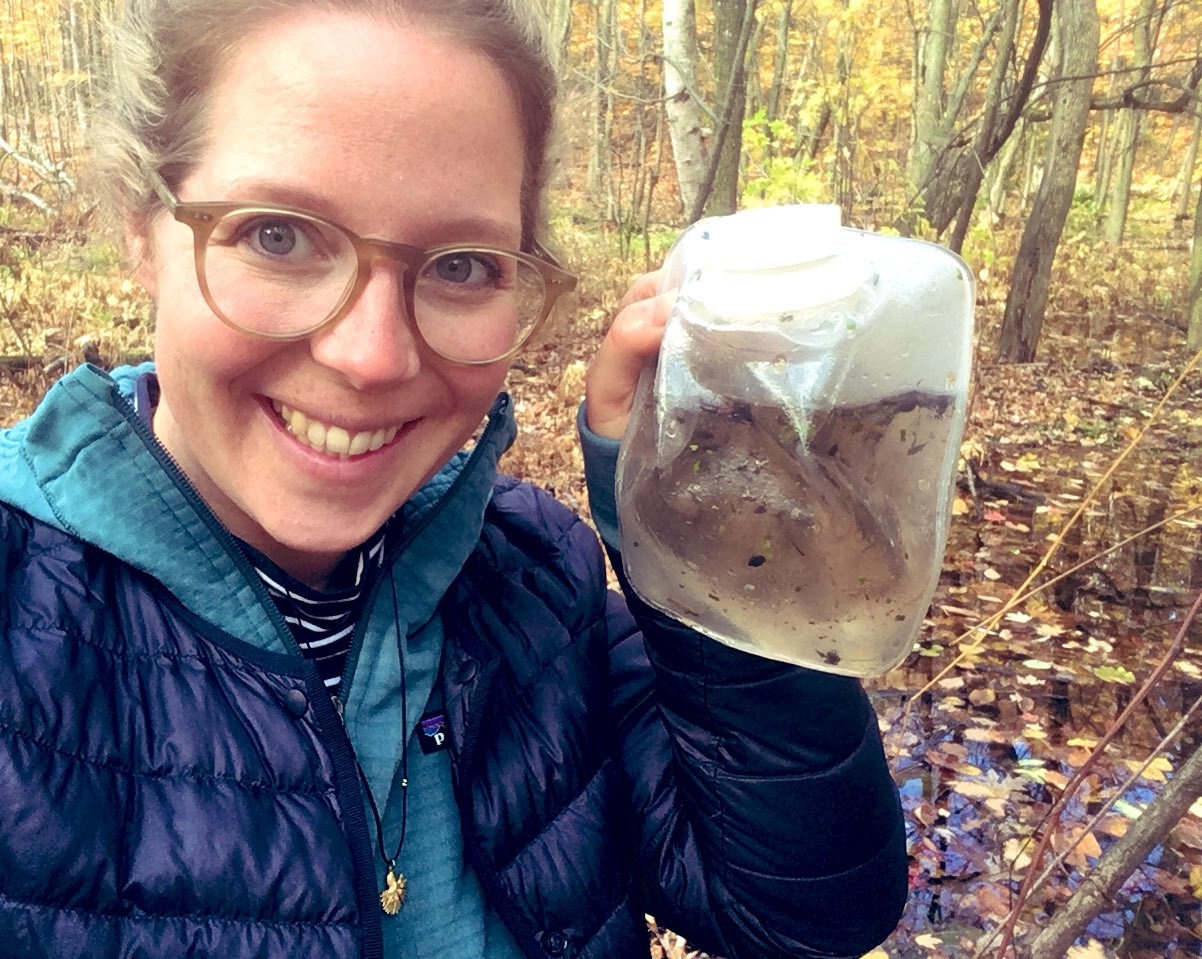
Photo: Me (happily) sampling Lemna minor on Mont Royal in Montreal in fall 2019.
July, 5, '22. New preprint on EcoEvoRxiv. Check out our new preprint entitled High tolerance to zinc but limited evidence for local adaptation in the aquatic plant species Lemna gibba/minor! This is the result of the work by MSc student Sofia Vámos and I'm super proud of her and this preprint.
Photo: Sofia setting up the experimental cultures for the reciprocal transplant experiment in the glasshouse.
June 12, '22. New preprint posted on Authorea. A manuscript led by Romana Limberger and Owen Petchey (among others) is now posted as preprint on Authorea. The paper is called Functional diversity can facilitate the collapse of an undesirable ecosystem state. We're excited to see it online!
June, 3, '22. New story My short story on Daphnia resting eggs has been published in Horizonte. It was a pleasuring learning about the drought resistance of Daphnia resting eggs and to synthesize all the information into a concise story.
March 30, '22. Successful grant application I am very grateful and excited because thanks to funding from the FAN (UZH Fonds zur Förderung des akademischen Nachwuchses), I will be able to conduct a study on duckweed population genetic structure in Switzerland. More on the project can be found here. Many thanks to the FAN and the Ernst Göhner Stiftung for funding my grant Elucidating the genomic diversity of a critically important aquatic plant.
March 28, '22. Paper accepted! My study The importance of ecotype diversity on duckweed growth with and without salt stress has been accepted for publication at Journal of Plant Ecology. In this paper, I tested whether a duckweed population consisting of multiple different ecotypes would outperform ecotype monocultures. They did, but only as the environment deteriorated. All the details you can find in the paper. Now online and open access here.
 February 28, '22. Today is a big day for Sofia Vámos. She handed in her MSc thesis entitled High tolerance to a metal pollutant, but no evidence for local adaptation in the aquatic plant species complex Lemna gibba/minor! After a full year of hard work, she submitted an excellent thesis. Congratulations, Sofia, supervising you was a wonderful experience.
February 28, '22. Today is a big day for Sofia Vámos. She handed in her MSc thesis entitled High tolerance to a metal pollutant, but no evidence for local adaptation in the aquatic plant species complex Lemna gibba/minor! After a full year of hard work, she submitted an excellent thesis. Congratulations, Sofia, supervising you was a wonderful experience.
February 25, '22. New story. A few months ago, I visited Vanessa Weber de Melo at EAWAG to find out about her research on algae and how they respond to interacting stressors. The story I wrote about my visit and her research was published in the local newspapers Glattaler and Zürcher Oberländer. I'm very excited to have written about mass spectrometry and how this method can help reveal stress responses of algae on the level of their metabolism. The story as PDF here
Photo: The newspaper article in print on my doorstep.
February 9, '22. Blogpost. For my science journalism degree, I wrote a blogpost (in German) about urban diversity and how less gardening can help animals thrive.
February 4, '22. Paper accepted! Our paper Species interactions in three Lemnaceae species growing along a gradient of zinc pollution has been accepted for publication at Ecology and Evolution! We tested whether the presence of a second species influenced the growth rate of the three duckweed species Lemna minor, Lemna gibba, and Lemna turionifera. Indeed, we found that the growth rates of the individual species were influenced by the identity of the competing species. We also saw that all three species had a high tolerance to zinc (Zn), with low levels of Zn even boosting their growth. In the future, we want to do similar experiments in more natural settings and over longer time spans. This paper is now published (open access!) and can be found here
Photo: Lorena Lanthemann setting up the sterile duckweed cultures.
January, 6, '22. New story Last fall, for my science journalism degree, I visited Samuel Wüst at Agroscope and wrote a story about his research. The story is now published on higgs. Have a look if you're interested in how Samuel Wüst is trying to breed more resistant grape varieties to make sure that we can continue to drink wine in the climate crisis.
Photo: Grape leaves with and without powdery mildew infection.
December 16, '21. New preprint Our preprint Species interactions in three Lemnaceae species growing along a gradient of zinc pollution is now available online. Congratulations to the first author, Lorena Lanthemann, who did the research for this study during an internship with me this summer.
December 10, '21. New position In a few weeks, on 1.1.2022, I will start a new position as Postdoctoral researcher in the group of Meredith Schuman at the Department of Geography of the University of Zurich. I am super excited and both happy and relieved that my journey in research will continue and to still be part of the University Research Priority Program on Global Change and Biodiversity.
November 4, '21. The first (but hopefully not the last) story I wrote for my science journalism degree is now published in Tagesanzeiger. It's about the horse breeding facility of Agroscope in Avenches. Writing the story has been a very enjoyable experience and I can't wait to write another one!
October 5, '21. New preprint My manuscript entitled The importance of intraspecific diversity on duckweed growth with and without salt stress is now available online as a preprint. Link to the preprint
August 27, '21. Short outreach video (in German) about the research being done at our Department. I very briefly explain what questions we are trying to answer in our group. Das Department stellt sich vor.
 July 12, '21. New group member Lorena Lanthemann starts her summer internship today. In the coming weeks, she will look at how species interactions influence duckweed resistance to heavy metal pollution. Welcome, Lorena, I'm excited to have you on board!
July 12, '21. New group member Lorena Lanthemann starts her summer internship today. In the coming weeks, she will look at how species interactions influence duckweed resistance to heavy metal pollution. Welcome, Lorena, I'm excited to have you on board!
May 12, '21. Manuscript accepted Our paper Effects of plant community history, soil legacy and plant diversity on soil microbial communities has been accepted for publication at Journal of Ecology. In this article, we assessed bacterial and fungal community composition in the soils of our experimental plots in the Jena Experiment using 16S and ITS sequencing. Soil microbial diversity was positively but weakly associated with plant diversity, with the strongest difference in microbial diversity between plant monocultures and any community of more than one plant species. Particular plant community compositions were associated with particular microbial community compositions. Soil legacy (old soil) increased soil bacterial richness and evenness more strongly than did plant community age. Plant community age (old plant communities) significantly affected the abundance of 10% of fungal OTUs. Some effects of soil legacy on bacterial and fungal diversity were indirect via changes in soil abiotic and biotic properties. Our findings suggest that as experimental ecosystems develop over time, plant communities associate with specific microbiomes and plant species associate with specific soil microbial species. The paper is now online!
March 17, '21. Manuscript accepted I'm very happy that the paper resulting from a outdoor freshwater mesocosm experiment at the Large Experimental Array of Ponds (LEAP) at the Gault Nature Reserve (Quebec, Canada) has been accepted for publication at Oikos. We showed that pre-exposure to moderate acidification allows the maintenace of an ecosystem cycle at pH 3. Link to the publication.

Photo: Experimental mesocosms at LEAP at the Gault Nature Reserve (Quebec, Canada).
 March 1, '21. Start of MSc thesis project Today Sofia Vámos joined my project to conduct a series of duckweed experiments in the framework of her MSc thesis in Ecology at the University of Zurich. She will test whether she can find evidence for local adaptation in the common duckweed. I am very excited to have her on board, and I am looking forward to working with her. Welcome, Sofia!
March 1, '21. Start of MSc thesis project Today Sofia Vámos joined my project to conduct a series of duckweed experiments in the framework of her MSc thesis in Ecology at the University of Zurich. She will test whether she can find evidence for local adaptation in the common duckweed. I am very excited to have her on board, and I am looking forward to working with her. Welcome, Sofia!
February 17, '21. New publication! My commentary entitled Born with a silver spoon: Dandelion parents’ life experiences affect the lives and afterlives of their offspring has now been published in New Phytologist! I commented on the excellent paper by Javier Puy & colleagues and wrote about how transgenerational inheritance of plasticity via epigenetic mechanisms can provide a way for plants to adapt to a changing climate and novel competitors. The paper is open access (yay!) and can be found here.
February 3, '21. Editorial board member at Ecology & Evolution. I have joined the editorial board of Ecology & Evolution as an Associate Editor and I'm looking forward to handling your submissions!
August 17, '20. Manuscript accepted! I'm thrilled that my final PhD chapter entitled Co-occurrence history increases ecosystem stability and resilience in experimental plant communities has been accepted for publication in Ecology. In this paper, we showed that co-selected plant communities recovered better from a flood than naïve communities and they were also more temporally stable in terms of their community biomass. The paper is now published online!

Photo: The Jena Experiment.
July 13, '20. New preprint! In the framework of my PhD project and the Jena Experiment, we looked at the influence of plant diversity and plant community history on microbial soil community composition. Have a look at the preprint here!
June 15, '20. Grant awarded! I got awarded a competitive UZH Forschungskredit Postdoc grant to conduct a series of experiments investigating the response of aquatic plant communities to environmental stress and how it's modified by diversity!
May 14, '20. I'm happy to announce that in a couple of months, on 1st of July 2020, I will return to the University of Zurich where I will continue my current projects with Andy Gonzalez and Owen Petchey. Due to COVID-19, we'll have to see what form this research will take.
Jan 29, '20. New preprint alert! You can now find a preprint of my Postdoc work at LEAP on bioRxiv. We applied wavelet analysis to show how acidification affects the temporal stability of DO functioning in plankton communities held at a mesocosms platform, the Large Experimental Array of Ponds (LEAP). We show that 1) acidification resulted in a transient loss of diurnal DO variation, and 2) that a pre-exposure to weaker acidification alleviated the impact on the DO temporal stability. In the context of global change, it is essential that we understand how freshwater communities respond to environmental degradation and how we can restore their function. And we believe that this paper contributes to the search of said understanding. Have a look and let me know what you think.
Dec 1, '19. Paper accepted! As an early Christmas present, Functional Ecology has accepted our paper entitled Plant responses to diversity-driven selection and associated rhizosphere microbial communities led by Terhi Hahl and co-authored by me, Marc W. Schmid, Debra Zuppinger-Dingley, Bernhard Schmid and Cameron Wagg. In an experiment using grassland plants grown in both monocultures and species mixtures for 11 years, we found that root microbes associated with the plants influenced plant growth differently depending on whether the plants were from monoculture or mixtures. Furthermore, plants from monocultures invested more in defence against enemies than plants from species mixtures. This suggests that plants in monocultures and mixtures may favour different strategies. How the plants responded, however, depended strongly on the species. Our results indicate that plant diversity loss in the long-term could lead to selection for altered plant-plant and plant-soil interactions. The species-specific capacity to respond, however, makes it difficult to predict community-level responses to diversity loss.
Link to the paper.
October 8, '19. Oral presentation at BES2019 in Belfast I'm very happy that my abstract for the BES annual meeting for an oral presentation has been accepted. I'm very much looking forward to meeting some familiar and new faces in Belfast in December.
October 3, '19. Blog post behind the scenes. We were invited to contribute to the Spotlight Molecular Ecology blog to provide a view behind the scenes of our paper on rapid evolution in grasslands. We share some pictures, the motivation behind the study and the lessons we learned. Have a look here!
July 18, '19. Paper accepted! Our paper (and my PhD chapter) on rapid evolution in grasslands has been accepted for publication in Molecular Ecology. This is work I'm particularly proud of, because, to my knowledge, this is the first paper trying to establish whether epigenetic and/or genetic divergence is responsible for the observed biodiversity effects in the field. The hypothesis was that plants that grow in experimental (or potentially natural) mixtures evolve to be more suited for said environment, either via selection on standing genetic/epigenetic variation or by novel mutations arising over time. Vice versa, plants growing in monoculture would be selected for different set of traits and their underlying genetic/epigenetic factors. We have found genetic divergence for 5 perennial grassland species, but little evidence for epigenetic contribution. This paper
could be really important for the field of grassland community ecology (and beyond).
Link to the paper. For a PDF, contact me directly.
van Moorsel, S.J.°, Schmid, M.W.°, Wagemaker, C.A.M., van Gurp T., Schmid, B. & Vergeer, P. Evidence for rapid evolution in a grassland biodiversity experiment. Molecular Ecology 28:4097–4117
°equal contribution
The faculty of Science at the University of Zurich reported about our paper here.
Für die Deutschsprachigen: Die Mathematisch-naturwissenschaftliche Fakultät der Universität Zürich berichtete über unsere Forschung hier.
Dec 14, '18. Paper accepted in Molecular Ecology I'm very happy to report that our paper led by Marc W. Schmid, Terhi Hahl and me has been accepted for publication in Molecular Ecology. In this publication, we looked at the rhizosphere microbiome of plants that had either a background of growing in plant mixtures or monocultures. We found that plant identy and soil legacy (from either plant mixture or monoculture) drove the formation of distinct microbiomes. We conclude that plant species richness can affect belowground community composition and diversity, feeding back to the assemblage of rhizosphere bacterial communities in newly establishing plants via the legacy in soil.
Schmid, M.W.°, Hahl, T.°, van Moorsel, S.J.°, Wagg, C., De Deyn, G.B. & Schmid, B. Feedbacks of plant identity and diversity on the diversity and community composition of rhizosphere microbiomes from a long-term biodiversity experiment. Molecular Ecology 28:863–878

Sept 20, '18. The LEAP 2018 project at the Gault Nature Reserve in Mont-St-Hilaire is slowly coming to an end. We will sample the 107 freshwater meta-communities for another couple of weeks and then dive into the most exciting part of any scientific project: data exploration! My focus will be to investigate the stability of these freshwater communities over time and in response to multiple stressors, i.e. acidification and temperature. This record-hot summer in Quebec will be a valuable “free” stressor. For any updates and to know what has been happening these past months, check out my Twitter handle @sofiavanmoorsel or the LEAP project Twitter handle @LEAP_sci.
May 25, '18. SNF Early.Postdoc Mobility grant accepted: My Postdoc grant entitled Extending evolutionary rescue to aquatic metacommunities has been accepted. This is huge! And it means that I get to stay in Montréal for at least another year and a half. I'm of course incredibly excited and happy and looking forward to continue working within LEAP and with Andy Gonzalez.
May 19, '18. Manuscript accepted: I'm very happy that my PhD Chapter entitled Selection in response to community diversity alters plant performance and functional traits has been accepted for publication in Perspectives in Plant Ecology, Evolution and Systematics. Using five plant species selected for twelve years in a biodiversity experiment in mixture or monoculture and plants without such a selection history, we assessed whether differential selection altered productivity, biodiversity effects, and functional trait differences within newly assembled monocultures and 2-species mixtures.
April 6, '18. New publication: I'm happy to have contributed to a paper by Eri Yamasaki et al. Genomics meets remote sensing in global change studies: monitoring and predicting phenology, evolution and biodiversity recently published in Current Opinion in Environmental Sustainability.. In this paper we suggest integrating genomics and remote sensing to strengthen global change studies.
March 1, '18. Move to Montréal: I'm thrilled to announce that I've moved from Zurich to Montréal to do a Post-doc with Prof. Andy Gonzalez at McGill University. I'll be working within the LEAP project. All about the LEAP you can find here. Follow LEAP on Twitter (@LEAP_sci) to stay in the loop during the upcoming field season and for any exciting findings!
January 16, '18. New Phytologist Profile: A profile about myself was published in January 2018 in the Forum Section of New Phytologist. Have a look here. This is a rather weird publication which might not boost my h-index too much, but it will make my family proud. Thanks to New Phytologist for this opportunity.
January, '17. Post-doc position: I am very excited to start a Post-doc with Prof. Owen Petchey and Prof. Andrew Gonzalez in February 2018!
October 16, '17. Paper published: Today my first thesis chapter was accepted for publication in Ecology Letters. We tested effects of community evolution on primary productivity in 48 different plant communities of 1, 2, 4 or 8 grassland species. We found that productivity was increased if communities were assembled from plants that had previously been growing together for 8 years compared with communities assembled from plants without a common history. The observed positive effect of community evolution on productivity was independent of the presence of co-selected soil organisms but restricted to low diversity; mixtures of 8 species were not affected. We conclude that to preserve well-functioning ecosystems we need to protect interacting species in a community context.
You can read the paper here
October 4, '17. Successful PhD Defense: I successfully defended my thesis entitled Community Evolution Increases Ecosystem Functioning and Stability. Thanks to everyone who attended my presentation and the celebration afterwards. You can read the thesis here.
September 19, '17. Guest post for New Phyt blog: I was invited to write a short post about the 40th New Phytologist Symposium in Vienna. You can read it here.
September 15, '17. Poster Award: My poster won the poster prize at the New Phytologist Symposium in Vienna. Thanks to all the delegates for voting for my poster!